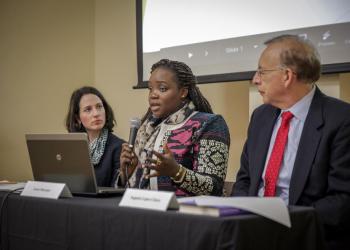Perspective | It’s time for a new conversation on power
By Saphira Rameshfar
The Commission on the Status of Women (CSW) -- the largest UN gathering on gender equality -- is a momentous space, striking in the volume and variety of events to attend and people to meet. There is a magnificent display of human diversity. National costumes catch the eye. Beautiful and heart-wrenching displays throughout the halls of the United Nations provoke the mind.
Yet there was a softer, quieter moment during CSW that stood out to me. The Baha’i International Community had just hosted a dialogue on the role of education in advancing gender equality alongside grassroots women and community practitioners and a representative from the World Bank, when a woman in attendance raised her hand and offered some thoughts on how exciting and refreshing it was to be at an event that helped us consider how to rethink the current systems and structures of society.
“The way we’ve done things has gotten us to this point. I guess we have to reimagine things if we want to move past this,” she offered.
I agreed with her sentiment but I found myself wondering why it was such a unique conversation. Afterall, event after event highlighted the regressions that women around the world have experienced --the backlash against female empowerment, the pushback against ideals of equality. If a system prevails that makes you work so hard for gains only to be vulnerable to losing them by one shift in policy, isn’t it obvious that the heart of our conversations and focus should be on creating a system that cannot be so easily manipulated by self-interest and fear?
A dominant theme I noticed throughout the first week of this year’s Commission centered around power. These conversations seemed to suggest that power is a limited resource which must be taken by one group from another. This zero-sum conception of power sheds some light on why some, namely those who have it, might be reticent to give it away to those who do not. But this view of power, rooted in a system of conflict and contestation, is at odds with my own conception of it. This reading of power uses the term somewhat interchangeably with capacity, and that capacity is often cast in terms of domination and oppression. Yet I view power as a limitless resource that one can channel to enact great things in the world. If the capacity to enact is used towards nefarious ends, in my mind, that is not true power. That is force and coercion that has been glorified by the appellation power, when it, in fact, represents a weakness in human character and a defect in the social order.
True power-- the power to uplift, to unite for a greater good, to be just, to show compassion, to persevere, to transfigure-- can be tapped into not only by individuals and groups, but by entire communities, and even by the whole of humanity. This kind of power, which I attribute to the spiritual dimension of existence, can also be released, and this is the kind of power that I associate with empowerment. If one’s conception of power is expanded to include the capacities for unity and integration that yield collective prosperity and well-being, then one’s conception of governance, authority, and legitimacy must likewise be expanded.
All those committed to advancing the cause of gender equality are at a pivotal moment. As we take steps to prepare for the historic 25th anniversary of the Beijing Platform for Action in 2020, there is a key opportunity before us to reshape the conversation around power and empowerment. Will we continue to focus on perpetuating a system that has so often failed us, or will we bend our energies, time and resources towards creating a new one that has the power to uplift us all?
--
Saphira Rameshfar is a Representative of the Baha’i International Community to the United Nations and serves on the Executive Board of the NGO Committee on the Status of Women and co-chair of the Working Group on girls.
Read the full statement of the Baha’i International Community addressed to the UN Commission on the Status of Women here.
--
Follow the Baha’i International Community on Twitter, Facebook and Instagram
